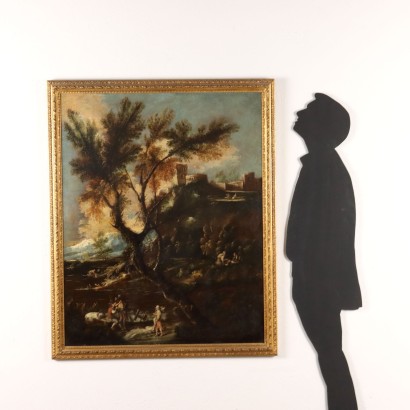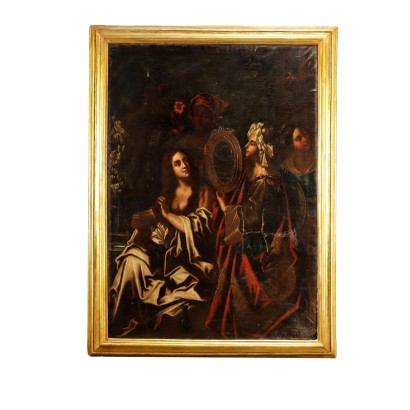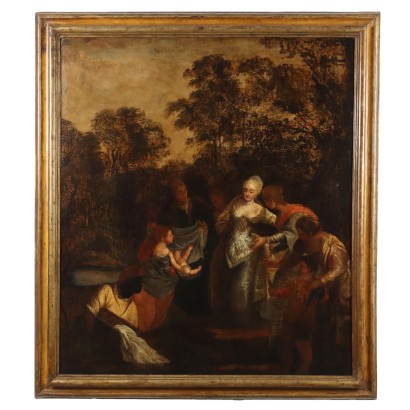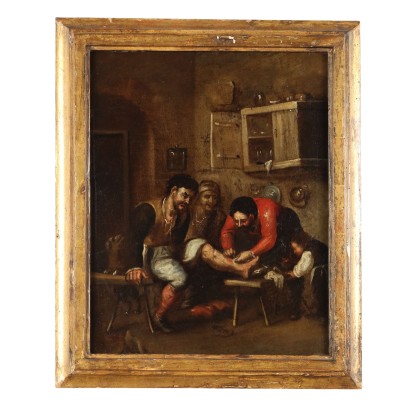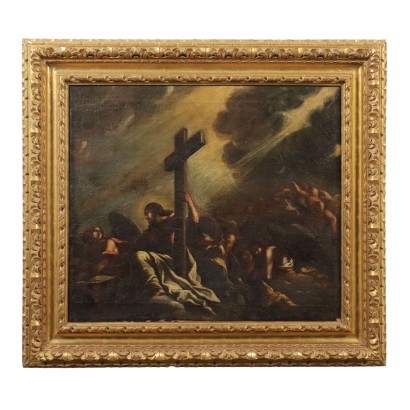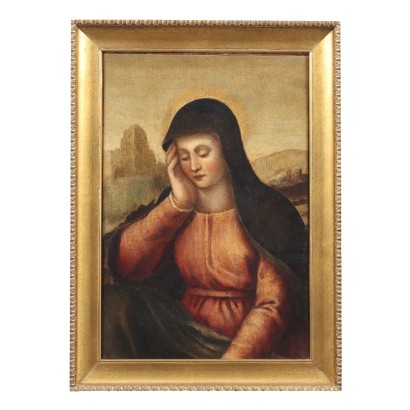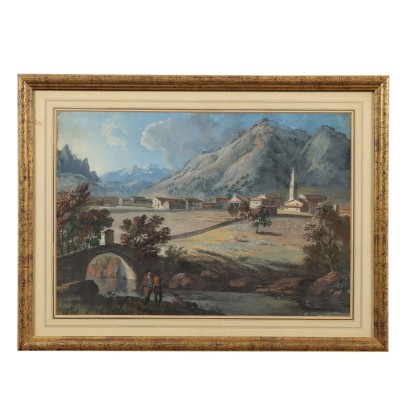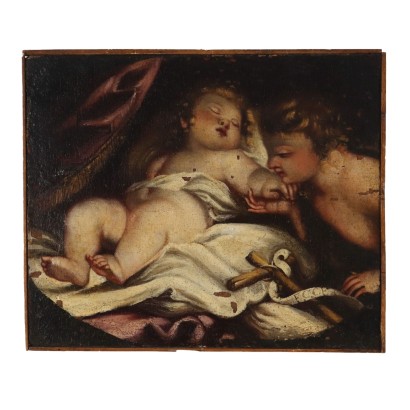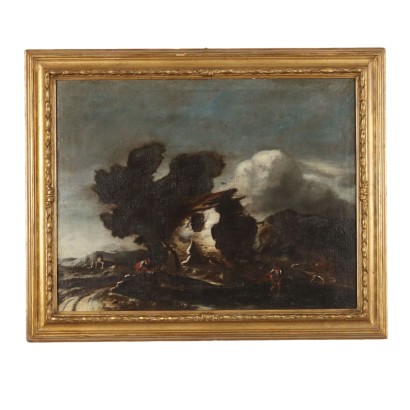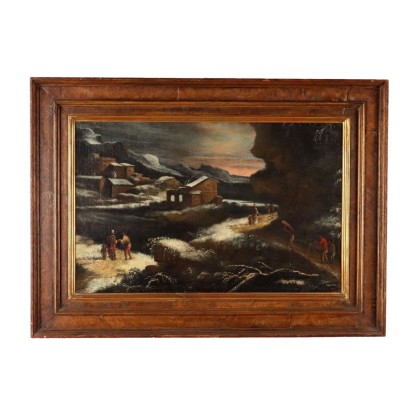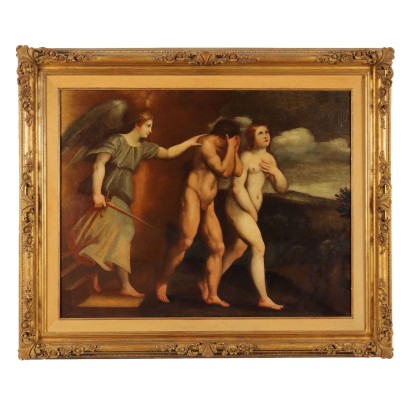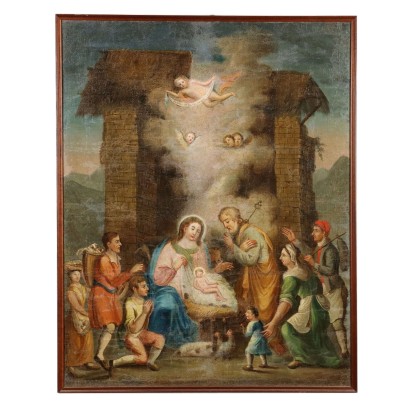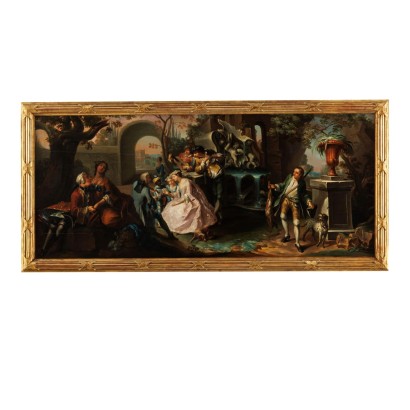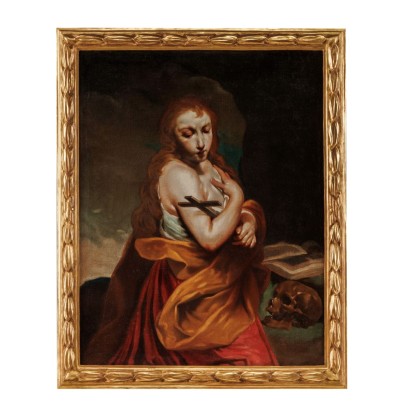Ancient Painting Attr. to A. Peruzzini Oil on Canvas Italy '700 - Landscape with Figures
Features
Landscape with Figures
Artist: Antonio Francesco Peruzzini (1650-1724) Attributed to
Artwork title: Paesaggio con figure
Age: 18th Century / 1701 - 1800
Subject: Landscape with Figures
Artistic technique: Painting
Technical specification: Oil on Canvas
Description : Paesaggio con figure
Oil painting on canvas. The large composition proposes a landscape with a large tree in the centre. to surmount with its sparse branches the countryside below, crossed by a stream and animated by various figures of commoners intent on activity or at rest; at the top right stands a fortress, which dominates the valley. Already attributed to Peruzzini from the Marches, the painting can certainly be traced back to his circle, due to the rapid and poorly aggregated pictorial strokes. Antonio Francesco specialized in landscape painting, undergoing the influence of Salvator Rosa and landscape painters such as Pietro Montanini and Pandolfo Reschi, and further influences also came to him from Nordic painters active in Italy, above all from Pieter Mulier known as il Tempesta. In his first works the originality of his painting can already be distinguished given a rapid drafting and an intense and brilliant chromatic timbre. The long artistic bond between Antonio Francesco Peruzzini and Alessandro Magnasco began in the early 1990s, following their meeting in Milan, where Peruzzini had settled; from this period onwards his painting seems to fall apart, through forms that become more dynamic and light, almost fantastic, to finally arrive at a style marked by an ever greater disintegration of the forms of nature and their movement. Restored and relined, the painting is presented in a period frame.
Product Condition:
Product in good condition, shows small signs of wear. We try to present the real state as fully as possible with photos. If some details are not clear from the photos, what is reported in the description will prevail.
Frame Size (cm):
Height: 130
Width: 105,5
Depth: 5
Artwork dimensions (cm):
Height: 118
Width: 96
Additional Information
Artist: Antonio Francesco Peruzzini (1650-1724)
Antonio Francesco Peruzzini, belonging to a family of painters originally from Pesaro, including his father Domenico and his sons Giovanni, Antonio Francesco and Paolo, active in the Marche area and in Italian cities such as Rome, Bologna, Turin and Milan, during the seventeenth century and the first quarter of the eighteenth. Antonio Francesco's production is often associated with that of his brother Giovanni, the two having worked together. Antonio Francesco specialized in landscape painting, undergoing the influence of Salvator Rosa and landscape painters such as Pietro Montanini and Pandolfo Reschi, and further influences also came to him from Nordic painters active in Italy, above all from Pieter Mulier known as il Tempesta. In his first works the originality of his painting can already be distinguished given a rapid drafting and an intense and brilliant chromatic timbre. The long artistic bond between Antonio Francesco Peruzzini and Alessandro Magnasco began in the early 1990s, following their meeting in Milan, where Peruzzini had settled; from this period onwards his painting seems to fall apart, through forms that become more dynamic and light, almost fantastic, to finally arrive at a style marked by an ever greater disintegration of the forms of nature and their movement.Age: 18th Century / 1701 - 1800
18th Century / 1701 - 1800Subject: Landscape with Figures
Artistic technique: Painting
La pittura è l'arte che consiste nell'applicare dei pigmenti a un supporto come la carta, la tela, la seta, la ceramica, il legno, il vetro o un muro. Essendo i pigmenti essenzialmente solidi, è necessario utilizzare un legante, che li porti a uno stadio liquido, più fluido o più denso, e un collante, che permetta l'adesione duratura al supporto. Chi dipinge è detto pittore o pittrice. Il risultato è un'immagine che, a seconda delle intenzioni dell'autore, esprime la sua percezione del mondo o una libera associazione di forme o un qualsiasi altro significato, a seconda della sua creatività, del suo gusto estetico e di quello della società di cui fa parte.Technical specification: Oil on Canvas
The oil painting is a painting technique using powder pigments mixed with bases in inert and oils.Other customers have searched:
Pittura antica, artisti italiani, pittura olio su tela, arte 800, pittura antica, arte novecento, oggetti d'arte, ritratto di signora, dipinto animali, quadro paesaggio montano, dipinto olio su tela, dipinto antico, dipinti natura morta, quadro antico, quadro del '600, pittori italiani quadri olio su tela paesaggi, paesaggio marino dipinto, paesaggio invernale dipinto, paesaggio autunnale dipinto, dipinto di paesaggio, arte antica, quadro religioso..
Se sei un appassionato d'arte, non perderti i nostri approfondimenti sul Blog Arte Di Mano in Mano e su FineArt by Di Mano in Mano - Arte:
Leggi di più
Ecco alcuni tra i principali articoli:
Vedute
Falsi nell'arte antica
Un messaggio di fiducia per ripartire
La potenza espressiva dell'arte figurativa etiope
Breve Storia del Collezionismo
Giorgio Upiglio, maestro dei libri d'artista
Matthias Withoos detto "Calzetta bianca"
San Rocco pensaci tu - Classic Monday
Dai un'occhiata alle nostre rubriche di divulgazione sull'arte:
Epoche
Lavorazioni e tecniche
Mostre ed Eventi
Protagonisti
Se sei appassionato di pittura antica, con tutta probabilità gusterai le schede di questi stupendi quadri:
"Dio parla a Noè dopo il diluvio", Jacopo da Ponte, detto il Bassano, seconda metà XVI secolo
Crocifissione, maestro della misericordia dell'accademia, terzo quarto del XIV secolo
Erminia incontra i pastori, Camillo Gavassetti, Seconda metà anni Venti del XVII Secolo
Eroine dell'antichità, Francesco Conti, XVIII secolo
Hieronymus III Francken, La Negazione di Pietro, XVII secolo
Jefte e la figlia, Girolamo Forabosco e aiuti, XVII secolo
L'Accademia di Platone, piccolo arazzo, fine XVII - inizio XVIII secolo
Maddalena e San Giovanni Battista
Natura Morta, Bartolomeo Arbotori, XVIII secolo
Sacra Famiglia con San Giovannino, Bartolomeo Ramenghi, scuola di, prima metà XVI secolo
Testa Femminile, Andrea del Sarto, ambito di, post 1522
Uva, fichi, melagrana e pesche su un capitello - Maximilian Pfeiler, primo quarto XVIII secolo
Sapevi che l'arte può essere anche un ottimo investimento (e non solo per grandi portafogli)?
L'Arte tra Collezionismo e Investimento
FineArt: Arte come investimento
Leggi di più
Ecco alcuni tra i principali articoli:Vedute
Falsi nell'arte antica
Un messaggio di fiducia per ripartire
La potenza espressiva dell'arte figurativa etiope
Breve Storia del Collezionismo
Giorgio Upiglio, maestro dei libri d'artista
Matthias Withoos detto "Calzetta bianca"
San Rocco pensaci tu - Classic Monday
Dai un'occhiata alle nostre rubriche di divulgazione sull'arte:
Epoche
Lavorazioni e tecniche
Mostre ed Eventi
Protagonisti
Se sei appassionato di pittura antica, con tutta probabilità gusterai le schede di questi stupendi quadri:
"Dio parla a Noè dopo il diluvio", Jacopo da Ponte, detto il Bassano, seconda metà XVI secolo
Crocifissione, maestro della misericordia dell'accademia, terzo quarto del XIV secolo
Erminia incontra i pastori, Camillo Gavassetti, Seconda metà anni Venti del XVII Secolo
Eroine dell'antichità, Francesco Conti, XVIII secolo
Hieronymus III Francken, La Negazione di Pietro, XVII secolo
Jefte e la figlia, Girolamo Forabosco e aiuti, XVII secolo
L'Accademia di Platone, piccolo arazzo, fine XVII - inizio XVIII secolo
Maddalena e San Giovanni Battista
Natura Morta, Bartolomeo Arbotori, XVIII secolo
Sacra Famiglia con San Giovannino, Bartolomeo Ramenghi, scuola di, prima metà XVI secolo
Testa Femminile, Andrea del Sarto, ambito di, post 1522
Uva, fichi, melagrana e pesche su un capitello - Maximilian Pfeiler, primo quarto XVIII secolo
Sapevi che l'arte può essere anche un ottimo investimento (e non solo per grandi portafogli)?
L'Arte tra Collezionismo e Investimento
FineArt: Arte come investimento
Product availability
The product can be seen at Cambiago
Immediate availability
Ready for delivery within 2 working days from ordering the product.




